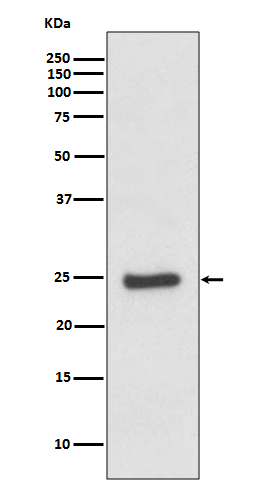

| WB | 咨询技术 | Human,Mouse,Rat |
| IF | 咨询技术 | Human,Mouse,Rat |
| IHC | 1/100-1/200 | Human,Mouse,Rat |
| ICC | 技术咨询 | Human,Mouse,Rat |
| FCM | 咨询技术 | Human,Mouse,Rat |
| Elisa | 咨询技术 | Human,Mouse,Rat |
| Aliases | E3 ubiquitin-protein ligase ZNRF2; ZNRF2; Zinc/RING finger protein 2; RNF202; Protein Ells2; ;ZNRF2 |
| WB Predicted band size | 24 kDa |
| Host/Isotype | Rabbit IgG |
| Antibody Type | Primary antibody |
| Storage | Store at 4°C short term. Aliquot and store at -20°C long term. Avoid freeze/thaw cycles. |
| Species Reactivity | Human,Mouse,Rat |
| Immunogen | A synthesized peptide derived from human ZNRF2 |
| Formulation | Purified antibody in PBS with 0.05% sodium azide,0.05% BSA and 50% glycerol. |
+ +
以下是关于ZNRF2抗体的3篇参考文献的简要总结,包含文献名称、作者及摘要核心内容:
---
1. **文献名称**:*ZNRF2 regulates endosomal sorting by mediating ubiquitination of VAMP3*
**作者**:Zhang Y, et al.
**摘要**:该研究通过ZNRF2抗体进行免疫沉淀和Western blot分析,发现ZNRF2作为E3泛素连接酶,介导VAMP3蛋白的泛素化,从而调控内体膜运输过程,影响细胞膜受体(如EGFR)的循环与降解。
2. **文献名称**:*ZNRF2 inhibits Wnt/β-catenin signaling by targeting Frizzled for lysosomal degradation*
**作者**:Chen B, et al.
**摘要**:利用ZNRF2特异性抗体进行免疫荧光共定位实验,研究显示ZNRF2通过泛素化修饰Frizzled受体,促进其溶酶体降解,负调控Wnt信号通路。研究揭示了ZNRF2在结肠癌中作为肿瘤抑制因子的潜在作用。
3. **文献名称**:*Differential roles of ZNRF2 and ZNRF3 in neuronal development*
**作者**:Lee S, et al.
**摘要**:通过ZNRF2抗体在小鼠脑组织中的免疫组化分析,发现ZNRF2在神经元分化中高表达,并通过调控mTOR信号通路影响轴突生长,提示其在中枢神经系统发育中的关键功能。
---
**备注**:若需获取具体文献,建议通过PubMed或Google Scholar搜索上述标题,或结合DOI进一步定位。部分研究可能需关注其抗体应用的方法学描述部分。
ZNRF2 (Zinc and Ring Finger 2) is an E3 ubiquitin ligase involved in regulating cellular processes such as membrane protein trafficking, receptor turnover, and Wnt signaling pathways. Structurally, it contains a characteristic RING domain critical for its enzymatic activity in mediating ubiquitination, a post-translational modification that tags target proteins for degradation or functional modulation. ZNRF2 primarily interacts with cell surface receptors, including Frizzled and LRP5/6 in the Wnt pathway, promoting their internalization and lysosomal degradation to fine-tune signal transduction. This regulatory role positions ZNRF2 as a key player in maintaining tissue homeostasis, cell polarity, and differentiation.
Antibodies against ZNRF2 are essential tools for studying its expression, localization, and interaction networks. They enable detection via techniques like Western blot, immunofluorescence, and immunohistochemistry, aiding in research on its physiological and pathological roles. Dysregulation of ZNRF2 has been implicated in cancers, neurodegenerative diseases, and metabolic disorders, with altered expression levels correlating with disease progression. Notably, ZNRF2 is functionally distinct from its homolog ZNRF1. exhibiting broader tissue distribution and differing substrate specificities. Current studies focus on exploring ZNRF2 as a therapeutic target or biomarker, leveraging antibody-based assays to dissect its mechanisms in disease contexts and evaluate potential interventions targeting ubiquitination pathways.
×